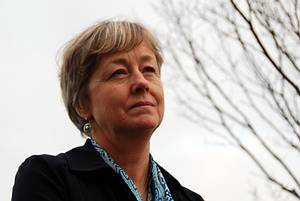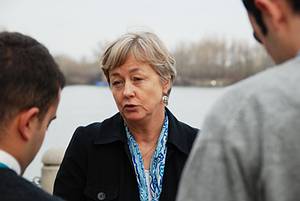Orange interviewed Olöf Oláfsdottir, Head of the Education for Democratic Citizenship and Human Rights (EDC/HRE) Division of the Council of Europe.

Can you briefly describe the goals and tasks of the EDC/HRE Division of the Council of Europe?
Our main task is to implement programs on EDC/HRE and we encourage all member countries of the Council of Europe to incorporate Human Rights education into their school systems and curricula. We also help them by providing tools and information on how to participate in education programs on democracy.
Why are you participating in this conference and what are your expectations?
Essentially I am here to meet with the network of EDC coordinators. There is one person present from each member state, who is responsible for the implementation of our program in their country. I had a meeting with them to discuss our projects and to see how we can advance. The second reason for my presence is to meet the people of the DARE network. They are working in the fields of HRE and I want to talk with them about their experiences.
What are the most important issues concerning EDC/HRE that are currently being discussed in the Council of Europe?
A very important issue that we are now discussing is the draft of a Human Rights charter for Europe that can be adopted on common basis by all member states. At the moment the situation differs from country to country. We would like to have such a text because it could be a good reference for everyone active in the field of Human Rights.
Is there an opposition in the different European countries against this idea?
No, I would not put it that way, because we have been working on this issue together for a long time. But of course people need to talk about it. Dialogue is essential, but it takes time. There are big differences between some countries so we can’t get anywhere without dialogue.

What is the role of the NGO’s and of the non-formal education sector in this process? Are they important?
They are extremely important, because the school system is completely overloaded with all kind of subjects, which makes it difficult to immediately introduce an EDC/HRE program into the curricula. It is not easy, so partnerships are needed. Outside of school you can teach some topics in an easy way through events, meetings and conferences held by people that work in the field of Human Rights and of course these people mostly come from NGO’s. So their input is very useful.
Is the current global economical and financial crisis affecting EDC/HRE issues in Europe?
In a way I think this situation may even help to make people reflect more about those issues, because usually when everything goes alright people just don’t see the need to discuss EDC and HRE. Now they might need to show solidarity and support for other people.
Does the EU need more competencies in the field of EDC/HRE?
It is up to them to decide. They already have the Charter of Fundamental Rights. With time the EU is going to get more competencies but now certain issues are our speciality.
If you had one wish for EDC/HRE in Europe, what would it be?
My wish is that all member countries would integrate EDC/HRE into the school system. It is possible, I am sure! Education on Human Rights and Democratic Citizenship can be even integrated into other subjects. Even a mathematics teacher can teach about Human Rights.
Posted in 2008-11: DARE conference| 17.11.2008
By: Edval Zoto



